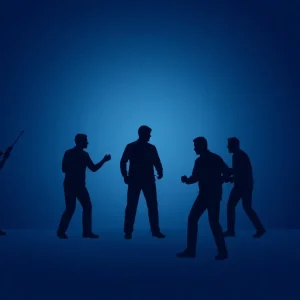Columbia Celebrates Historic Expungement Ceremony for Civil Rights Activists
COLUMBIA — On a sunny Saturday, the air was filled with joy as the community gathered at Richland County Judicial Center to witness a heartwarming moment in history. On October 25, two brave men, Charles Barr and Simon Bouie, received the long-awaited news that their convictions from the 1960s had been officially expunged. This ceremony, filled with emotion and significance, celebrated the courage of individuals who stood up against segregation and fought for equality.
It was a beautiful day in Columbia with the temperature soaring to a near record high of 86°F. The skies were full of abundant sunshine as family members and supporters crowded into the courtroom, eager to share in the celebration. As the ceremony unfolded, the atmosphere was electric with a mixture of relief, nostalgia, and remembrance.
A Step Back in Time
For Barr and Bouie, the events they commemorated brought back memories of a tumultuous time in American history. Both men were arrested in March 1960 while protesting the segregation of lunch counters at local pharmacies. Despite being students at Benedict College and Allen University, they took a stand against the unjust treatment faced by Black individuals, who were denied the right to sit and be served alongside White customers.
Their determination, however, led them to police officers and subsequent criminal charges for criminal trespassing and other offenses. But on this special day, Barr and Bouie were not alone in their triumph; five fellow activists, who were arrested with them back then but have since passed away, also had their records cleared in spirit. The courtroom was adorned with roses placed in honor of Rev. David Carter, Johnny Clark, Richard Counts, Milton Greene, and Rev. Talmadge Neal.
The Importance of Public Recognition
During the ceremony, Fifth Judicial Circuit Solicitor Byron Gipson emphasized the significance of this moment, especially considering it took place just over 60 years after the landmark Civil Rights Act was passed. “The people who walked those paths and went to jail — they’re still alive,” Gipson remarked. “We need to tell those stories.” This public ceremony stood in sharp contrast to how cases like these are usually handled, highlighting the need to acknowledge and honor the struggles faced by these activists.
Lessons from the Past
Barr, now 84, reflected on the fear and uncertainty that characterized being Black in America during the 1960s. “It was common for Black people to just ‘disappear,’ and no one would know what happened,” he recalled. Yet, the courage shown by the activists created ripples that contributed to the eventual passing of the Civil Rights Act in 1964, a law meant to guarantee equal rights for all Americans.
“We were on a mission to get served and be recognized as Americans in America in 1960,” Barr asserted, embodying the spirit and determination that drove their fight.
Long Overdue Correction
The movement to clear the records of Barr, Bouie, and fellow activists began in 2013, pushed forward by passionate leaders within the University of South Carolina Center for Civil Rights History and Research. Bobby Donaldson, between celebrations and memories, stated, “We are deeply fortunate to have among us the surviving student leaders and the families of those who marched with them for a long overdue correction of a historic wrong.”
Bouie, now 85, expressed immense gratitude for being alive to witness this historic moment. “To know that just two of us remain alive, to experience what we have today, I would have hoped that all of them could have been here,” he said. “It’s given me great joy.”
As the sun began to set, casting a warm golden hue over the city, attendees left the courthouse filled with a sense of purpose and hope. This expungement ceremony was not just a closing chapter for the lives of Barr, Bouie, and their cohorts, but a gentle reminder that the fight for equality can truly reshape the nation.









